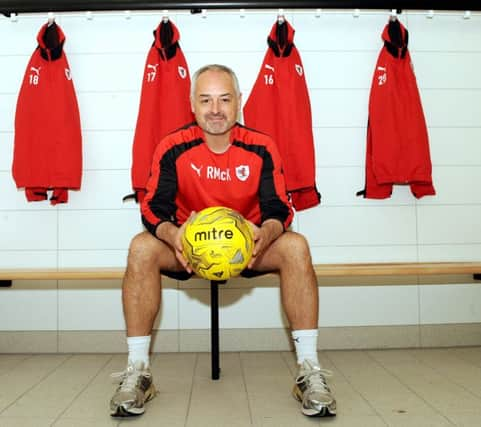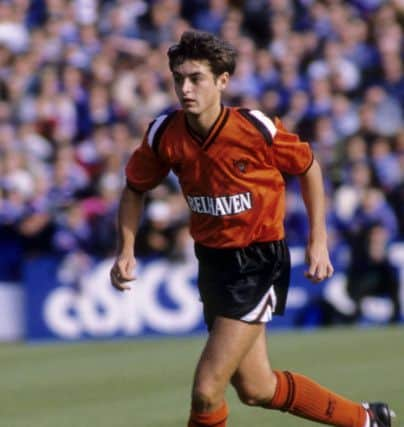Interview: Ray McKinnon making his mark on managerial front


They also ignited United – the Dundee tangerine version. While their names aren’t quite as revered as those of Giggs, Beckham and Scholes et al, they made the breakthrough 12 months earlier. For the class of 92, read class of 91.
Ray McKinnon, Duncan Ferguson, Grant Johnson, Gary Bollan, Alex Cleland. They referred to themselves as “the new breed”. Also usually included in the gang, if slightly older, was Michael O’Neill. It is fair to say they all tested the patience of Jim McLean. But they are all now making their way in coaching or management, something that ought to count as another feather in McLean’s cap.
Advertisement
Hide AdAdvertisement
Hide AdO’Neill’s achievements with Northern Ireland means he is out-stripping the others at present. However, while undertaking a quiet revolution at Raith Rovers, having, like O’Neill, already shone at Brechin City, McKinnon, now 45, is continuing to prove his own worth.


Someone once cast as abundantly talented but under motivated is now a leader of around 20 men (give or take a few youngsters out on loan, this is roughly the size of Raith’s small but clearly efficient squad). McKinnon disputes the notion of him as a young tearaway in any case.
“You don’t sign for Jim McLean twice if you can’t train or play well,” he points out, before adding, with reference to his own team: “They work so hard when we don’t have the ball. We need to be organised, work hard and know our job. That’s why we are winning games; it’s a well-organised, fit and talented squad.” It could almost be McLean speaking about the great sides he moulded at Tannadice. But it is McKinnon enthusing over the merits of a team he has led to five league victories on the bounce.
Left with precious little to work with in the summer following his arrival from Brechin, he has turned Raith into more than just a competitive Championship outfit. They are a promotion hunting one. Today they aim to beat visitors Hibernian and return to second place, behind Rangers. “I didn’t expect to be where we are at this minute. But I am proud of the boys for getting us there,” he says.
McKinnon has profited from contacts made during his stint as a well-respected technical development officer with the Scottish Football Association. On-loan Dundee player Craig Wighton is a talented gift from Paul Hartley, who studied for his coaching badges under McKinnon. Experienced striker Jon Daly admirably stuck to his promise to sign for Raith despite later interest from today’s opponents.
“Jon was at Dundee United and doing his B licence and I’d come through and do sessions with him, Willo Flood and Sean Dillon,” explains McKinnon, who is based in Monifieth. “So I’d come home at night after a day’s work and go and help them. Whether that’s a factor I don’t know. When Hibs spoke to Jon he said he had already given me his word; he is a terrific guy, a good leader, loyal. According to Jon he is enjoying his football now as much as he has ever done.”
It seems everyone is. Ally Gourlay, the club’s redoubtable press officer, says the current atmosphere is “the best since the original Jimmy Nicholl days”.
According to McKinnon, if there is a secret to his success it is treating players like adults and putting smiles on their faces. Unsurprisingly, such skills were not learned under McLean. Since his Nottingham Forest spell coincided with Brian Clough’s alcohol-infused decline, neither did McKinnon gain such enlightenment from this other legendary manager.
Advertisement
Hide AdAdvertisement
Hide AdRather, he credits Willie Miller, who he played for at Aberdeen and isn’t always easy to mistake for a ray of sunshine, with showing how a cheery atmosphere can lead to a more productive work environment. “We’d play and train hard and if we got beat on Saturday, he’d do his bit after the game. Then on Monday morning he was back to no grudges: ‘Morning Raymond, how was your weekend? Ready for training, let’s go and do it!’ At United you were terrified to go in after a defeat: ‘Morning!’ you’d say. ‘What’s so f***ing good about it?’ would come the reply.”
During his second spell at United, McKinnon famously scored a hat-trick of free-kicks at Kilmarnock in a 3-2 win. He only took three free-kicks all afternoon. Three goals. “It wasn’t three out of five kicks, it was three out of three,” he stresses. He shares the distinction with current AC Milan manager Sinisa Mihajlovic, who once scored three free-kicks for Lazio.
“We are the only ones to do it apparently; I bet he didn’t score three from three attempts,” says McKinnon. And yet McKinnon can’t recall being praised or congratulated afterwards; it wasn’t mentioned in the dressing room nor on the bus journey back.
McKinnon, who hails from a tough housing scheme in Dundee, is now fairly sure McLean is proud of him. But while crediting his old manager with having a significant bearing on him, McKinnon is unsentimental about McLean’s influence.
“Discipline – that’s the only thing I take from Jim McLean’s days, discipline,” he says. “When I say discipline, I mean standards. Good discipline within a club structure, that’s what I think people take from Jim McLean. I certainly never took his man-management skills.”
But even those who couldn’t stand the man’s methods still acknowledge he was a tactical genius, do they not? “I think it is stretching it,” replies McKinnon. “I only very vaguely remember him actually demonstrating things on the training field. He had so many talented players who helped him on the way, let’s be honest.”
McKinnon is perhaps, the most unlikely of the new breed to make the grade in management – even more so, possibly, than dear old Duncan Ferguson. While McKinnon is generally felt to have been the most gifted of the players emerging from Tannadice at the time, he is also reckoned to have most conspicuously failed to make the most of these talents. Probably because of this he is now doubly determined to get the best out of such potential stars at Raith as the currently injured Ross Callachan.
McKinnon’s own CV shows a list of clubs as long as your arm, ending with Lochee United, who he later managed. He even played for Raith – twice. Really? Blink and you might have missed both spells. Fortunately he was pressurised into taking his coaching badges. Not by McLean, but by his mother.
Advertisement
Hide AdAdvertisement
Hide Ad“I never appreciated the privileged position I was in,” McKinnon admits now. “I thought ability alone would get me through. Jim McLean said you will be 30 and the penny will drop and he was bang on. I will give him that. I must be a late developer. The penny keeps dropping for me a couple of years later than it should. But that’s good, it keeps me hungry. It feels like I am always catching up. Don’t get me wrong, I had a great career. But it could have been so much better if the penny dropped at 21.”
Where was he when the penny did drop? “Hmmm,” he wonders. “It could have been Montrose. Wherever it was, it was too late. Wherever it was, I wasn’t where I should have been.”
It is possible he still isn’t. There was speculation about a return to United a few weeks ago after Jackie McNamara left. “I heard my name was in the frame there,” he says. “They are my club, I hope they do well.”
If he owned a club, it is candidates like himself and Airdrie’s Gary Bollan, who have completed successful apprenticeships in the lower levels, who would attract him. “I would be looking for a hungry manager and I put myself in that bracket. I am hungry – and so is my team. I need to make money, there’s your honesty. To do that you need to get to the top.”